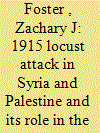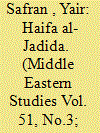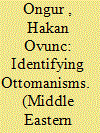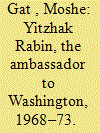|
|
|
Sort Order |
|
|
|
Items / Page
|
|
|
|
|
|
|
| Srl | Item |
| 1 |
ID:
139144


|
|
|
|
|
| Summary/Abstract |
The famine that befell Syria during the First World War was among the most tragic events in the region's modern history. The article argues that the 1915 locust attack, which is often neglected altogether or given terse treatment as one among a laundry list of causes of the famine, was a critical factor which drove many across the region, especially in Lebanon and Palestine, to starvation beginning in late 1915. Given that the scale of the attack was far worse than anything Syria had witnessed in many decades, if not centuries; and that a huge percentage of the region's major foodstuffs and sources of livelihood, including fruits, vegetables, legumes, fodder and a small but not insignificant amount of cereals, were devoured by the locusts, it is suggested that many of the 100,00–200,000 people that died from starvation or starvation-related diseases in the year immediately following the attack – that is, from November 1915 to November 1916 – can be attributed to the locust invasion.
|
|
|
|
|
|
|
|
|
|
|
|
|
|
|
|
| 2 |
ID:
139149


|
|
|
|
|
| Summary/Abstract |
The decolonization process in the 1940s and 1950s in Middle Eastern states under Great Britain's informal influence did not aim at recognizing the same type of independence of these states as that enjoyed by Britain and the United States. In the 1940s Washington laid the groundwork for its leading role in Iran during and following the Iranian oil crisis, whilst London with the assistance of the Americans in part reasserted British influence after the crisis. The United States achieved a paramount position in Iran with the assistance of its oil companies and through cooperation with Great Britain, and at the expense of the latter and the Soviet Union.
|
|
|
|
|
|
|
|
|
|
|
|
|
|
|
|
| 3 |
ID:
139148


|
|
|
|
|
| Summary/Abstract |
`Haifa al-Jadida` (New Haifa) was erected in 1761 by order of the Bedouin ruler Daher el-Omar, governor of the Galilee. As part of the process of building the city, a wall was constructed to encircle it, with a tower overlooking it from above. After its establishment the ‘New Haifa’ became the urban core for the emergence of modern Haifa while the new city was gradually solidified and its characteristic outlines were moulded. From the end of the Ottoman period in 1918 until 1948, the urban expanse remained practically unchanged. In 1948 ‘New Haifa’ was almost destroyed except for the few ruins that were left. In spite of the centrality of the new city in the history of Haifa, very little is known about this area. This article reconstructs the image of ‘New Haifa’ by portraying the location of the city walls and the urban expanse. For the purpose of reconstruction, an 1841 sketch of the city is superimposed on an aerial photograp of the area taken in 2008, and a map of the old city dated to 1937.
|
|
|
|
|
|
|
|
|
|
|
|
|
|
|
|
| 4 |
ID:
139143


|
|
|
|
|
| Summary/Abstract |
Elites are more than the producers of wealth and power; elites reproduce themselves and control the masses by means of norms and values. For many years, the Junblat family of Lebanon has based its leading role on the idea of protecting the Druze community's interests and rejuvenating Druze glory. Despite the enormous political, economic and social transformations the area has witnessed, the Junblat family has succeeded in maintaining a continuous tradition of leadership and power from the early seventeenth century to the present. This article will argue that the explanation behind the durability of this political power lies in what might be called the ‘ideology of adjustment’ on one hand and preserving organic communication with the masses on the other. Many conclusions can be drawn from the case of the Lebanese Junblat family regarding behavioural patterns and structures of traditional elites in the Arab Middle East. The most important is that traditional elites have no commitment to ideology other than to the degree that it allows them to adjust, serves their self-preservation and helps them to gain as much power as they can.
|
|
|
|
|
|
|
|
|
|
|
|
|
|
|
|
| 5 |
ID:
139146


|
|
|
|
|
| Summary/Abstract |
This article problematizes the much-used but under-analysed concept of Ottomanism, exploring its discursive evolution from the concept's origins in the nineteenth century to its present practice. Investigating its roots in an elitist multicultural project, the paper examines its integral role as part of the opposing intellectual subculture during the early Republican era and its later re-politicization as ‘neo-Ottomanism’ in Turkey's Özal-era foreign policy. The current practice of ‘banal Ottomanism’ by the AK Party is analysed as a symbolic component of the current re-identification of Turkish society, facilitating the reintroduction of Islamic-Ottomanist traditions into everyday routines.
|
|
|
|
|
|
|
|
|
|
|
|
|
|
|
|
| 6 |
ID:
139147


|
|
|
|
|
| Summary/Abstract |
The introduction of Protestantism into the Middle East by American missionaries in the nineteenth century met with limited success while the responses and internalizations of local converts proved incredibly diverse. The two resultant theological descendants are Palestinian Christian Zionists and Palestinian Liberation Theologists. The article provides a short history of these two movements and highlights influential voices through interviews and media analysis. This article argues that hybrid religious identifications with nation andplace has transcended, in some cases, political struggle for territory.
|
|
|
|
|
|
|
|
|
|
|
|
|
|
|
|
| 7 |
ID:
139145


|
|
|
|
|
| Summary/Abstract |
This article develops a comparative study of Turkish radicalism (i.e. Kemalism and Unionism) demonstrating its resemblances and differences vis-à-vis its European counterparts, especially French republicanism and Bolshevism. The historiographical vistas of Turkish radicalism are thoroughly examined to elaborate on the ancien régime imageries of Turkish radicalism and the contradictions inherent in these coexisting historiographical vistas. The article aims to develop a critical perspective of Turkish radicalism, arguing that many clichés reproduced in the academic literature had been in fact produced by the Kemalists as self-fashioning.
|
|
|
|
|
|
|
|
|
|
|
|
|
|
|
|
| 8 |
ID:
139150


|
|
|
|
|
| Summary/Abstract |
Rabin differed considerably from the average ambassador – a representative receiving and issuing reports. He viewed himself not only as a diplomat, but as capable of shaping policy with respect to both the Arab–Israeli conflict and the relationship with the United States. During his term as ambassador to Washington he displayed sober realism with regard to the political, and to some extent the military, reality – the very realism that was absent from the government that sent him.
|
|
|
|
|
|
|
|
|
|
|
|
|
|
|
|
|
|
|
|
|